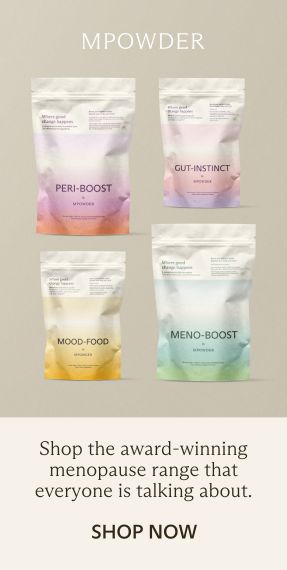Around 60% of us will experience menopause stomach bloating as part of our menopause transition. And gut discomfort can have a significant impact on our quality of life; from confidence levels to sociability and intimacy. This guide dives into science-backed strategies to soothe and alleviate menopause stomach bloating and stomach issues, and shines a spotlight on our hormone balancing range, designed to support your body at a foundational level.
What Causes Menopause Stomach Bloating?
Research now shows that fluctuating oestrogen and progesterone can slow digestion, disrupt gut flora, and increase fluid retention—leading to:
- Abdominal bloating and discomfort
- Gas, constipation, or indigestion
- Cramping and fullness
- Weight gain
The good news? Our guts want to love us back. And with a little targeted attention, can respond swiftly to new routines and protocols. Here’s 3 steps to make getting started simple:
Step 1: Rethink your eating habits for midlife
- Rather than reach for the coffee, start your day with freshly chopped ginger and lemon steeped in hot water for 15 minutes.
- Embrace anti-inflammatory whole foods from the moment you wake: leafy greens, berries, papaya, quinoa, and lean proteins are our favourites. Why not rethink your breakfast to include a clean protein source, fibre (See below!) and healthy fats that your gut will love?
- Prioritise soluble fibre: It’s pretty likely that you are not reaching recommended daily fibre levels! We love to reach for oats, apples, flaxseeds at breakfast - consider an overnight oats recipe, maybe adding cinnamon too to up your intake —and gradually add prebiotic foods like garlic and onions to support a healthy microbiome.
Step 2: Supplement simply with MPOWDER’s wholefood-led formulations
Gut‑Instinct: A botanical capsule blend including ACTAZIN® kiwi extract (600 mg), marshmallow root (300 mg), ginger root extract (125 mg), artichoke leaf extract, slippery elm (240 mg)—plus gentle brown rice powder. This trio of carminatives, bitters, and demulcents helps rebalance digestion and calm bloating
Peri‑Boost: Formulated for perimenopause, with cacao, collagen stimulating molodavian dragonhead, moringa, ginger, cinnamon, flaxseed, pea protein, and nourishing vitamins and minerals—designed to support stress resilience, digestion, and hormonal balance
Meno‑Boost: A powerful powder featuring lucuma, calcium citrate, strawberry, papaya, guava, rosehip extract, magnesium malate, maca, slippery elm, acai, pomegranate, KSM‑66® ashwagandha, lemon balm, red clover, as well as vitamins and minerals including B-complex, D3, K2, zinc, and iron to act as a foundational layer for menopause and post menopause health.
Mood‑Food: A capsule blend formulated with bacopa, turmeric, ashwagandha, lemon balm, alongside magnesium, zinc, B‑vitamins, chromium, copper, manganese—targeted to support mood, brain fog, and stress-related digestive issues.
Step 3: Rethink the ‘how’ as well as the ‘what’:
A whole body and mind lifestage, demands a whole body and mind approach to rebalancing out guts.
- Commit to moving with intent daily to support your digestion. And if you can move after eating, make a post-meal walk as habitual as cleaning your teeth
- Practice mindful eating—did you know that we should chew each mouthful at least 15 times?! And that a very short breathwork practice can aid digestion - and stop us gulping air?! Take your time. Focus on what is on your plate. And make eating a social event if possible too
- Incorporate micro wellness practices across your day; from an alarm reminding you to breathe, stand, stretch or step back and do a body scan - science shows all can help us manage cortisol which in turn will help with bloating.
Putting it all together: your happy gut daily routine
- Start the day with warm water with ginger, lemon and a little honey if needed
- Take Gut‑Instinct before meals to support digestion
- Add Peri‑Boost or Meno‑Boost, depending on your menopause stage
- Use Mood‑Food especially during stress peaks or brain-fog days
- Move gently, eat mindfully, and stay hydrated.
Frequently Asked Questions About our blends
Q1: When can I expect relief?
A: Many report digestive improvements within 1–3 weeks of consistent use and holistic habits.
Q2: Can I combine Peri-Boost and Meno-Boost?
A: No - each formulation is ‘complete’ and based on symptom focus. Select the best foundational powder from our range based on what is bothering you most right now. Or book time with our Health Concierge Team, for free.
Q3: Is Gut‑Instinct safe long-term?
A: Yes. Its high-quality botanical formula is designed for ongoing digestive balance.
Q4: Will Mood‑Food help stress-related bloating?
A: Absolutely—its blend of adaptogens, magnesium, and B-vitamins supports cortisol regulation and gut resilience.
Q5: Do I need all four products?
A: Our recommendation is to listen in. Introduce our supplements one at a time, track the impact with our free tracking service. And layer up as you need to. Our Product Finder Quiz is a great place to start.
Q6: What if bloating persists?
A: Ensure, always, that you discuss gut changes and discomfort with your medical practitioner. If they advise that your symptoms are menopause related, monitor your symptoms daily, and return to your healthcare professional if symptoms persist. The happiness of our gut is critical. And you should never simply accept issues.
When to Talk to a Doctor
You should always talk to your medical practitioner if you notice changes to your body and health. Although bloating is a very common symptom in menopause, it can also be a sign of an underlying health condition. Make sure you’ve made time for your health and been reassured that there is nothing else influencing your gut shift.
—-
Share Twitter Facebook Pinterest

